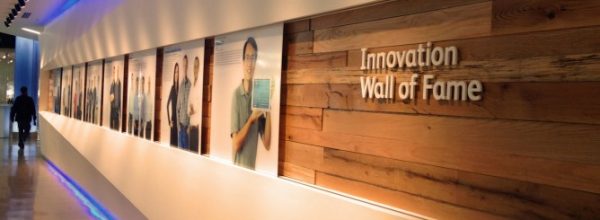Among the five tech giants that dominate today’s digital landscape, Facebook is the youngest, and it works to sustain its upstart, “hacker” culture even as it grows to thousands of employees and billions in revenue. To get a look at how Facebook approaches this task, CCI hosted a safari to Facebook’s Menlo Park campus for healthcare innovators as part of our Safety Net Innovation Network. Mark Tobias, who works in Facebook’s IT department, gave us a tour of the campus and explained the company’s organizational philosophy.

Facebook bought its current campus from Sun Microsystems and renovated it to look less like a typical office park and more like downtown Palo Alto, where Facebook had its first offices. The campus houses 6,000, and new buildings across the road will soon house more. The campus is filled with restaurants and cafeterias that provide free food, as well as a wide range of services and facilities for employees from a gym to car detailing. In some ways it is actually a small town. By providing these services, Facebook seeks to take care of many of life’s inconvenient tasks to keep employees happy and free them to work long hours.
Meanwhile the work spaces around campus are intended to reflect and promote the company’s flat hierarchy. Rather than private offices or assigned desks, work spaces are open and intended to encourage collaboration. Work stations are interchangeable—anyone can sit down at any one of them. Even founder Mark Zuckerberg doesn’t have an office all his own, they say.
According to Tobias, Facebook believes that good ideas can come from any corner of the organization, and their culture focuses on making sure that every employee knows how to make their ideas heard and taken seriously. Regular “hackathons” give an outlet for this philosophy. These involve 24-hour programing/visioning sessions where employees freely form and join teams to try out some idea that interests them. Afterwards the best ideas get elevated to a more official form of project management.
The company has grown so much there is starting to be more hierarchy, but there is still a sense that everyone can and should be the source of good ideas to change and improve the company and product. To maintain this they make Facebook “culture” integral to their hiring process. Part of this culture is an “ask forgiveness, not permission” willingness to try new things that go counter to established practice. Tobias emphasized this with an anecdote about taking it into their own hands to paint a crosswalk in front of their old Palo Alto offices when the city dawdled in responding to its request. Another illustration is the murals on some of the campus walls. Facebook invites artists to come create these murals—often in a modern, edgy style—but asks them to sign contracts affirming that Facebook can paint over these murals whenever they want. The lesson is: be willing to accept radical change at any time.
Find this useful or interesting? We’re constantly sharing stuff like this. Sign up to receive our newsletter to stay in the loop.







